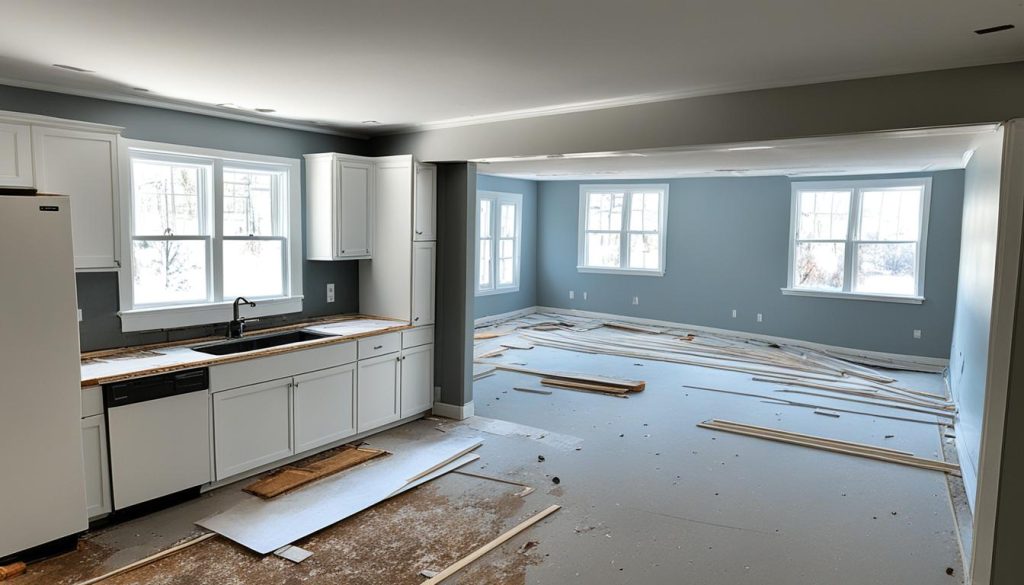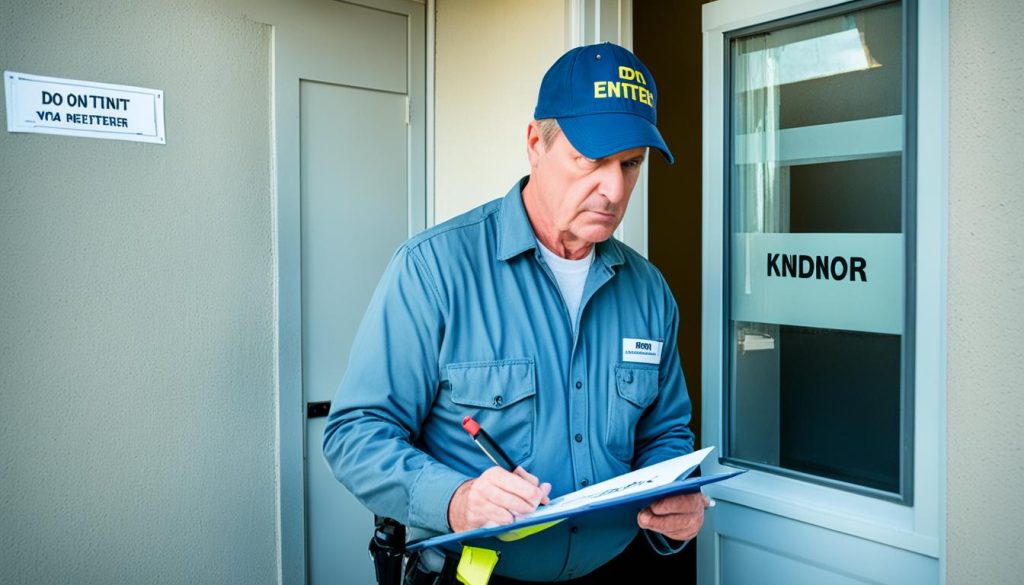Did you know that most kitchen renovation projects in Ontario require a permit under the Ontario Building Code? While homeowners have the freedom to undertake construction projects on their property, certain renovations must comply with legal regulations.
In order to determine whether or not you need a permit for your kitchen renovation, it’s important to understand the specific requirements outlined in the Ontario Building Code. Cosmetic changes such as replacing cabinetry, countertops, appliances, flooring, and light fixtures generally do not require a permit. However, if your renovation involves structural changes, such as moving load-bearing walls, adding or removing walls, windows, doors, or utilities, you will likely need a permit.
Key Takeaways:
- Most kitchen renovations in Ontario require a permit under the Ontario Building Code.
- Cosmetic changes like replacing cabinetry and countertops generally do not require a permit.
- Structural changes such as moving walls or utilities usually require a permit.
- Obtaining a permit ensures the safety and legality of your renovation.
- The cost of a kitchen remodel permit in Ottawa starts at $98, with additional fees based on construction value.
When Do I Need My Kitchen Renovation Permit?
In order to ensure a smooth and legal kitchen renovation project, it is crucial to obtain the necessary permit before starting any construction work. In Ottawa, the process typically takes about 5 business days for the permit to be reviewed and issued. Therefore, it is important to plan ahead and complete all the required paperwork in advance to avoid any unnecessary delays.
Once you have successfully obtained your kitchen renovation permit, it is essential to prominently display it in a visible spot on-site before commencing the renovation. This is to ensure that the permit is easily accessible and can be inspected by the relevant authorities if necessary.
By adhering to the regulations and obtaining the required permit, you can proceed with your kitchen renovation confidently, knowing that you are following all the necessary legal requirements and ensuring the safety of your project.
What Inspections Do I Need to Book During Renovations?
Once you have obtained your kitchen renovation building permit, it is crucial to schedule and attend inspections throughout the construction process. These inspections ensure that the renovation work is being done according to the proper standards and regulations. The number of required inspections will vary depending on the scope of your project and the specific guidelines set by your local building department.
Typically, for major jobs such as plumbing or electrical work, you can expect to have at least two inspections scheduled. These inspections are essential to ensure the safety and compliance of your renovated kitchen. To give you an idea, here are some common inspections that may be required:
- Structural inspection: This inspection focuses on the structural changes made during the renovation, such as adding or removing walls, altering the layout, or modifying load-bearing structures.
- Electrical inspection: This inspection ensures that the electrical work, including wiring, outlets, and fixtures, meets the required safety standards and codes.
- Plumbing inspection: This inspection verifies that the plumbing system, including pipes, drains, and fixtures, is installed correctly and functions properly.
- HVAC inspection: If your renovation involves changes to the heating, ventilation, and air conditioning system, an HVAC inspection may be necessary to ensure proper installation and compliance with regulations.
These are just a few examples, and the specific inspections required for your kitchen renovation permit process may vary. It is essential to consult with your local building department or permit office to understand the exact inspections that are needed for your project. They will provide you with the necessary information and guidelines to follow.
Remember, failing to schedule and attend the required inspections can result in delays, penalties, or even having to redo work that does not meet the necessary standards. Therefore, it is crucial to stay informed and diligent throughout the renovation process to ensure a smooth and successful project.

What Happens If I Don’t Get a Permit?
When it comes to kitchen renovations, obtaining the necessary permits is crucial. Failure to do so can lead to serious consequences, both financially and legally. Let’s explore the potential repercussions of proceeding without a permit.
Hefty Fines
If you are caught renovating your kitchen without the required permit, you may be subject to substantial fines. In Ottawa, for example, the penalties for a first offense can reach up to $50,000, while subsequent offenses can result in fines of up to $100,000. These fines are meant to discourage individuals from disregarding the necessary regulations and ensure that all renovations meet the safety and compliance standards set by the authorities.
Voided Insurance Coverage
Another aspect to consider is the potential risk to your insurance coverage. If you undertake a kitchen renovation without the proper permits and a building failure occurs, your insurance provider may refuse to cover the damages. This means that you will be solely responsible for any financial losses resulting from the incident. It is essential to comply with permit regulations not only to avoid fines but also to protect yourself financially in case of unforeseen complications.

Subpar Workmanship
Aside from the legal and financial ramifications, skipping the permit process can also compromise the quality of your renovation. Permits ensure that the work is carried out by qualified professionals who adhere to building codes and safety standards. Without proper oversight, the final result may not meet the required quality or pose potential risks to the occupants of the home. By obtaining the correct permits, you can ensure that your kitchen renovation is completed to the highest standards of workmanship and safety.
Reselling Complications
Furthermore, failing to obtain permits for your kitchen renovation may lead to complications when you decide to sell your property in the future. Prospective buyers will often request documentation to verify that any renovations were conducted legally and according to code. If you cannot provide the necessary permits, it may make it more difficult to sell your home or significantly impact its market value. Obtaining permits not only protects you in the present but also ensures a smoother selling process should you decide to move later on.
To summarize, obtaining a permit for your kitchen renovation is not just a formality but an essential step. Failure to do so can result in significant fines, voided insurance coverage, subpar workmanship, and complications when selling your property. By following the permit regulations, you can ensure the safety, legality, and long-term value of your kitchen renovation project.
How Do I Procure a Kitchen Renovation Permit?
When planning a kitchen renovation, one important step is obtaining a permit to ensure compliance with building codes and regulations. To get a permit for renovating your kitchen, there are a few steps you need to follow.
The first step is to fill out an application. The application form can usually be found on your local municipality’s website or obtained from the building department directly. Make sure to provide accurate and complete information to avoid any delays in the approval process.
Along with the application, you will need to submit detailed plan drawings of your proposed kitchen renovation. These drawings should include measurements, the location of appliances, plumbing fixtures, electrical outlets, and any structural changes. It’s crucial to ensure that your plans adhere to the specific requirements set by your local building department.
Once you have completed the application and gathered the necessary documentation, you will need to pay the required fee. The cost of a kitchen renovation permit may vary depending on your location and the scope of your project.
Remember, the application process may differ among municipalities, so it’s essential to research and understand the specific requirements of your local building department. By following these steps and obtaining the necessary permits, you can proceed with your kitchen renovation project confidently and legally.

Leave a Reply
You must be logged in to post a comment.